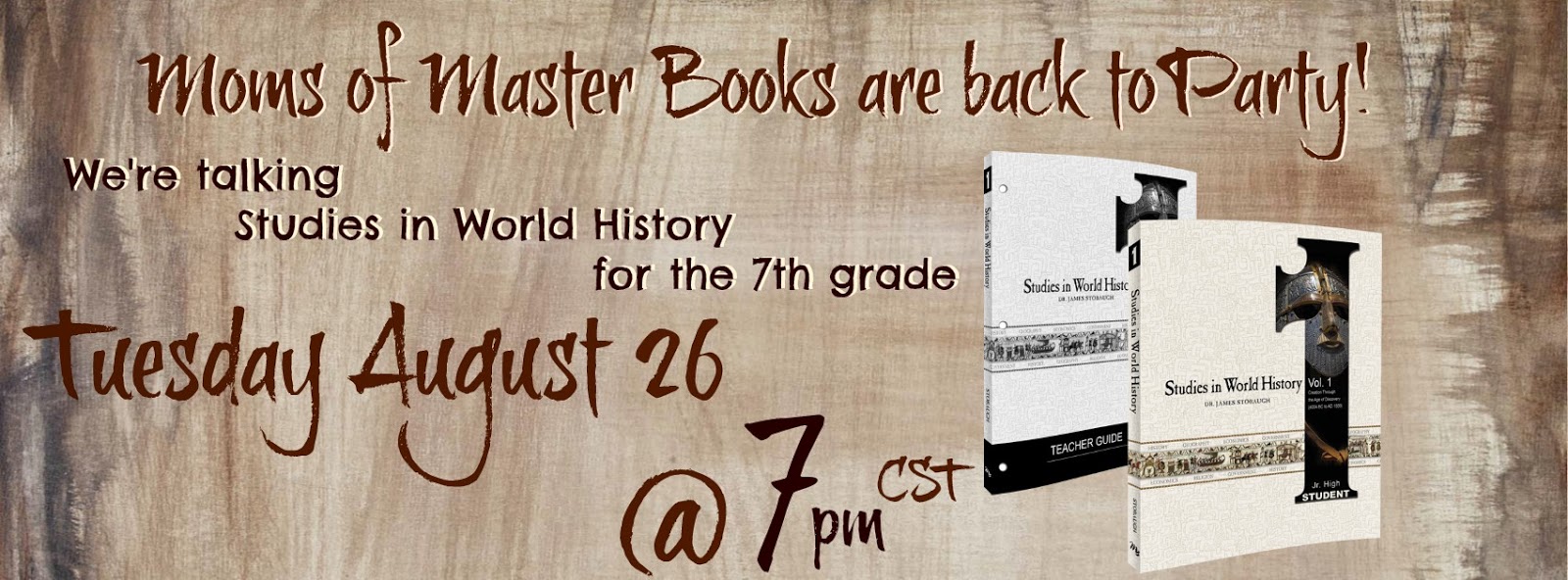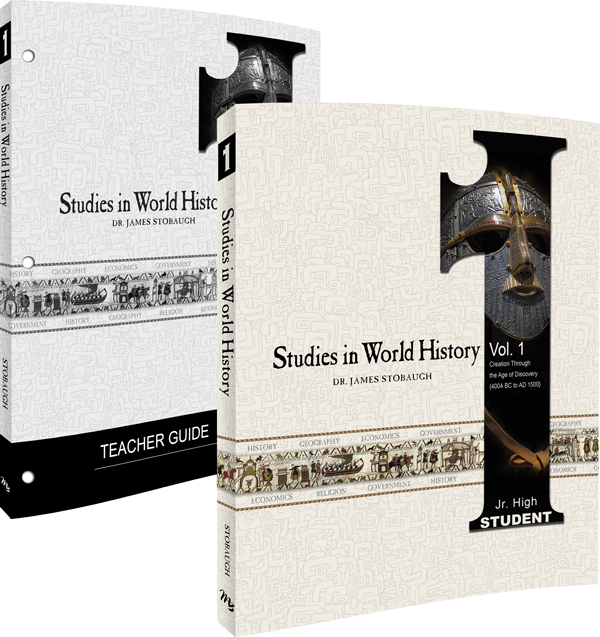But my next two guys, well, they aren't Connor. They are definitely different people.
So making Studies in World History Vol. 1: Creation Through the Age of Discovery work for them was easy.
This is the first volume in a 3-year program for junior high. This one is intended for 7th graders, however, I've been using it with my 8th and 9th graders. The intended sequence is:
- 7th grade - Creation Through the Age of Discovery (4004 BC to AD 1500)
- 8th grade - New World Through the Modern Age (1500 AD to 1900 AD)
- 9th grade - Modern Age Through Present (AD 1900 to present)
The course is set up with 34 chapters, starting with The Fertile Crescent and ending with 1492: The New World. Each chapter includes:
- Introductory material, including a paragraph or so of "First Thoughts," learning objectives, and a list of concepts to be covered. (Student book)
- Five lessons that include reading material, illustrations, and discussion questions. (Student book)
- Answers to the discussion questions. (Teacher Guide)
- A test that usually has them filling in the answer from a list of words. (Teacher Guide)
- An essay question type of test. (Teacher Guide)
- Answers for both exam options. (Teacher Guide)
I am doing this with both of my students, and we are currently in Chapter 3: God's Precious Treasure: Prospering in a Hostile Place. Our basic weekly plan looks something like this:
- Monday: I read aloud the introductory material to both of my guys, and we talk a little bit about the concepts.
- Monday through Friday: they read the lesson for the day, and we get together to discuss the discussion question. I love the interaction. If things get busy, I'll have them actually write up answers, but this works for us right now.
- Friday: they take the first exam option, independently. This is what I grade. We discuss the second exam choice together. Because we love discussions like this.
My teens love the fact that this incorporates geography into the studies, with good descriptions of the places. We haven't gotten far enough that they've seen this for themselves, but the series also incorporates economics and government systems, so this is not "just" history. William, my 9th grader, is particularly excited about economics principles being a part of this.
As much as they don't love taking tests, they have been pleased with these. "They aren't asking off-the-wall questions about minute details that don't matter," said one. The other added, "the questions actually relate to what we've read and are pretty straight-forward."
William pointed out that the illustrations used are fantastic, and they seem to be there for a reason, "not just thrown in to make it look pretty." When I asked, he pointed out the maps especially.
They also mentioned that this isn't so date-focused. "Though maybe it is only because we're still in time periods where the dates are all fuzzy. Hopefully, though, the books will continue to be more about why than they are about exactly when." Big picture is what my guys like.
Some things I really like include the fact that this is meant to take roughly 20-30 minutes a day. I love that. I hate when one subject gets totally crazy in time requirements.
I've scanned ahead, for purposes of this review, and am very pleased to say that I really do like the choices made for what to cover. Many of the chapters focus on a specific geographic region (Early Japan in chapter 7, Eastern Europe in chapter 21) and cover a pretty long time period. Some of the chapters are more event-oriented (Alexander the Great in chapter 11, Charlemagne in chapter 30, or The Crusades in chapter 33).
This seems like a solid and easy-to-implement overview of world history, and we are going to continue using this. My teens won't let me stop.
You can check out the trailer for the series:
And go see what other Moms of Master Books have to say about Studies in World History.

There is a Book and a Treat Facebook party coming up tonight, July 26 at 7 pm Central Time, where you could win cool prizes -- and discuss the series too.
Disclaimer: I received this set of books for free from New Leaf Publishing Group as part of the Moms of Master Books program. No other compensation was received. The fact that I received complimentary products does not guarantee a favorable review.

No comments:
Post a Comment